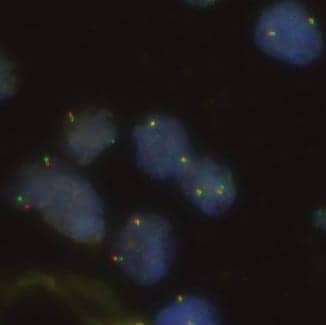Oxford Gene Technology (OGT), Oxford, UK, has launched two new CE-marked fluorescence in situ hybridization (FISH) probes. The Cytocell Aquarius ROS1 Plus Breakapart and RET Breakapart probes detect rearrangements in the genome associated with non-small cell lung cancer (NSCLC).
Lung cancer is the most commonly diagnosed cancer as well as the leading cause of cancer death in males. Worldwide, lung cancer accounted for 1.8 million new cases in 2012, with NSCLC accounting for 85% of these.1,2
“As NSCLC can be classified into different molecular subtypes, accurate genomic identification of the correct subtype is of paramount importance for targeted treatment,” says Manisha Maurya, a clinical scientist at Royal Marsden National Health Service Foundation Trust. “In our validation studies, the new Cytocell probes for NCSLC showed tight, bright signals, allowing easy visualization and scoring of results. These probes will further improve our ability to stratify and treat NSCLC.”
“Cancer research is advancing at a rapid rate,” says Steve Chatters, OGT senior product manager for pathology. “At OGT, we work with leading clinical scientists to develop innovative products that utilize the latest scientific understanding. This is exemplified by our new Cytocell Aquarius ROS1 Plus Breakapart probe, which has been designed to cover not only the ROS1 region but also the region deleted in ROS1-GOPC fusions, enabling more comprehensive analysis.”
The probes are available in two economical sizes and are premixed in hybridization buffer, saving time and minimizing potential errors. Fully optimized for use on formalin-fixed, paraffin-embedded (FFPE) samples, Cytocell FISH probes are designed to deliver high-intensity signals with minimal background. For more information, visit Oxford Gene Technology.
REFERENCES
- Ervik M, Lam F, Ferlay J, Mery L, Soerjomataram I, Bray F. Cancer Today [online]. Lyon, France: International Agency for Research on Cancer, World Health Organization, 2016. Available at: http://gco.iarc.fr/today. Accessed October 7, 2016.
- Molina JR, Yang P, Cassivi SD, Schild SE, Adjei AA. Non–small cell lung cancer: epidemiology, risk factors, treatment, and survivorship. Mayo Clin Proc. 2008;83(5):584–594; doi: 10.4065/83.5.584.




